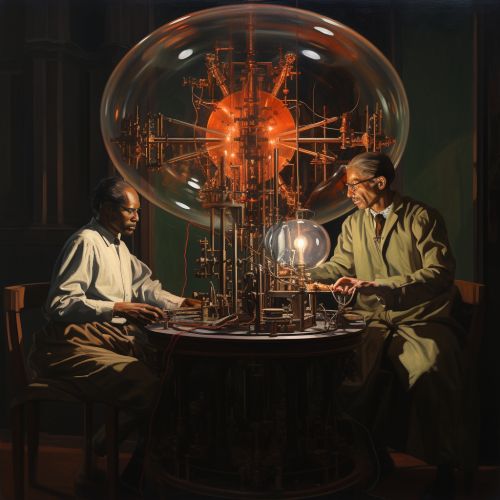Commutation relation
Introduction
In quantum mechanics, the commutation relation is a fundamental concept that describes the relationship between two operators when they are applied in sequence. The commutation relation is defined by the commutator, which is a binary operation that takes two operators and produces a new operator. The commutation relation is a central concept in quantum mechanics, as it underlies the uncertainty principle and the structure of quantum states.


Definition
Given two operators A and B, the commutation relation is defined by the commutator, denoted [A,B], which is defined as [A,B] = AB - BA. This operation measures the extent to which the two operators fail to commute, or equivalently, the extent to which the order of operations matters. If [A,B] = 0, then the operators A and B are said to commute, meaning that the order of operations does not matter. If [A,B] ≠ 0, then the operators do not commute, and the order of operations does matter.
Commutation relations in quantum mechanics
In quantum mechanics, the commutation relations between operators have profound physical implications. For instance, the commutation relation between the position operator x and the momentum operator p is given by [x,p] = iħ, where i is the imaginary unit and ħ is the reduced Planck constant. This commutation relation is the mathematical foundation of the Heisenberg uncertainty principle, which states that the position and momentum of a particle cannot be simultaneously known with arbitrary precision.
Another important example of a commutation relation in quantum mechanics is the commutation relation between the angular momentum operators Lx, Ly, and Lz. These operators satisfy the commutation relations [Lx,Ly] = iħLz, [Ly,Lz] = iħLx, and [Lz,Lx] = iħLy. These commutation relations are the basis for the quantization of angular momentum in quantum mechanics.
Commutation relations and symmetries
In quantum mechanics, the commutation relations between operators are closely related to the symmetries of the physical system. Specifically, if an operator commutes with the Hamiltonian of the system, then the corresponding physical quantity is conserved. For instance, if the momentum operator p commutes with the Hamiltonian H, then the momentum of the system is conserved. This is a quantum mechanical manifestation of Noether's theorem, which states that every symmetry of a physical system corresponds to a conserved quantity.
Commutation relations and quantum states
The commutation relations between operators also play a crucial role in the structure of quantum states. In particular, the commutation relations between the creation and annihilation operators in quantum field theory determine the structure of the Fock space, which is the state space of a quantum field. The creation and annihilation operators satisfy the commutation relations [a(k),a†(k')] = δ(k-k'), where a(k) is the annihilation operator, a†(k') is the creation operator, and δ(k-k') is the Dirac delta function. These commutation relations are the basis for the quantization of fields in quantum field theory.
